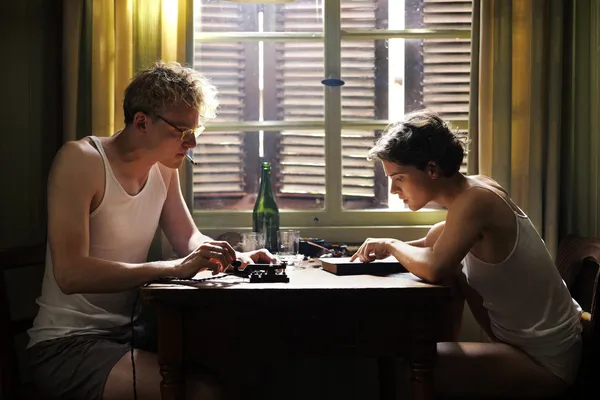Eye For Film >> Movies >> From Hilde, With Love (2024) Film Review
From Hilde, With Love
Reviewed by: Jennie Kermode

Part of the Nazi vision of the ideal Germany the lifestyle they supposedly wanted to preserve, was the small family farm or garden in which people worked diligently to harvest the gifts of nature. In the opening scene of Andreas Dresen’s film, the titular Hilde is urged by her mother to pick berries. If she doesn’t, there won’t be any jam. But Hilde’s life is taking her in a direction where she won’t be able to enjoy the fruits of her labour.
Based loosely on the life of the real Hilde Coppi, but largely sidestepping her politics and touching only loosely on her involvement with hiding people in targeted groups (which would otherwise have consumed a lot of screentime just to deliver an already familiar kind of drama), Dresen’s work begins with Hilde’s arrest, when eight months pregnant, and concentrates on the time she spent in Barnimstrasse women's prison in Berlin. Intercut with this, in reverse chronological order, we get the story of her love affair with Hans Coppi, the resistance fighter who, in this version, inspired much of her rebellious activity.

Heroes like the two of them have so often had their stories told in an overblown way that it can be difficult to get to grips with what their experiences must really have felt like – perhaps one of the reasons why younger generations have found it hard to engage with stories from the period. Admirers of his earlier films will be unsurprised to discover that Dresen isn’t interested in that kind of portrayal. Right from the first interrogation scene, it’s clear how naïve and poorly prepared these rebels are. In the flashbacks that follow, we will see them do all sorts of ill-advised things, spending time together simply for the sake of friendship when it was obvious they might have to disavow any association. Partying by a lake in golden sunshine, they seem far, far too young to be expected to handle this situation – which, of course, was true of many people in their situation, only adding to the tragedy of it.
Dresen has spoken about how his desire to make the characters relatable led to wardrobe choices which wouldn’t look too out of place today. Although fewer viewers will be familiar with it, the prison system into which Hilde is inducted doesn’t seem so very different either. Despite the brutality of the regime behind it, the prison is a managed in a more matter-of-fact way. There are rules, but no gratuitous threats or arbitrary punishments. Visitors are allowed, and there are occasional small acts of kindness from members of staff. When Hilde goes into labour, the nurses do their best for her. Nobody blames the child for the mother’s choices.
This non-sensationalist approach allows much more room to address the psychological effects of prison life itself, whilst emphasising the mundanity of much of what happened under the Nazis. Had everything required immediate threats and demonstrations of barbarity, it’s doubtful that they could have kept it together for very long. Simply relying on the self-interest of individuals – including the prisoners themselves, who generally prioritised the avoidance of additional suffering for as long as possible – was a much more efficient approach. The more we see of the prison, the more it resembles an industrial processing plant, moving human beings along a conveyer belt in accordance with their various prescribed destinations. The final scene there makes this more stark than ever. There is no obvious cruelty to it, simply an absence of feeling.
Achieving quite a resemblance to the real Hilde, with a slight figure and shy, slightly awkward way of carrying herself, Liv Lisa Fries is a capable lead. She handles the long moments of stillness well, along with the different kinds of subdued emotion associated with caution and depression, but can turn in an instant to fiery passion in the scenes when she and Hans are alone together. If these seem inappropriate to the time, it’s worth noting that the liberality of the Weimar period did not end overnight and that, in any event, polyamorous relationships and sex outside of marriage have always been more common in times of war, when other structures become less practical. Though she’s still one of the more reticent people in her circles, Hilde’s eager sexuality provides a poignant contrast with the misery of her time as a prisoner.
The supporting cast is also good. As Hans, Johannes Hegemann finds just the right kind of chemistry. Already possessed of a criminal record, he seems like the authority in the relationship, the one with things to teach, but there’s a boyish affability about him that makes him immediately likeable and all too obviously vulnerable. Meanwhile, his physical presence, tall and blond and every inch the ‘Aryan’ type that the Nazis fetishised, lends the film a certain irony. The standout amongst the actors, though, is Lisa Wagner as prison warden Miss Kühn, the most complex character in the film, whose balance of facilitation and mercy gets to the heart of the matter.
A thoughtful contribution to the genre, From Hilde, With Love finds its own direction and is all the better for it.
Reviewed on: 27 Jun 2025

















